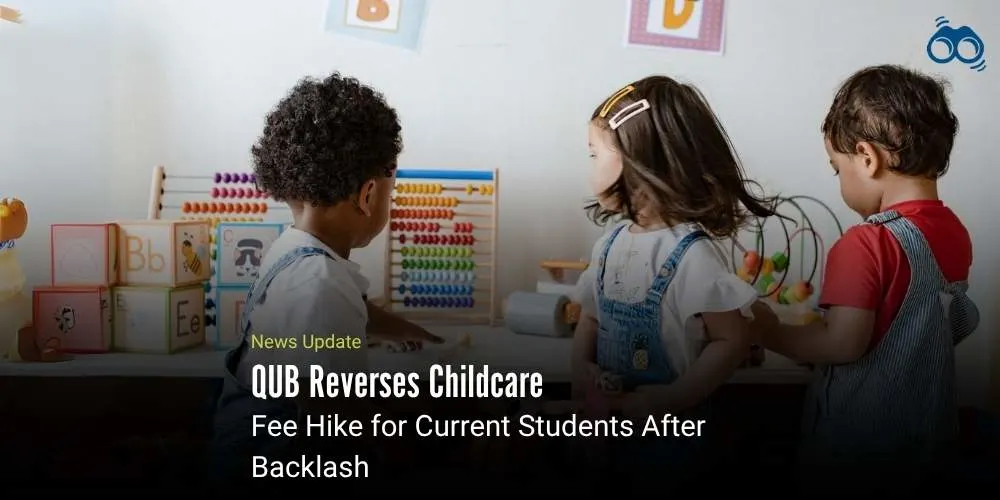QUB Responds to Backlash, Freezes Childcare Fees for Enrolled Student Parents
Childcare Fee Increase Scrapped for Existing Users at Queen’s University Belfast
Queen’s University Belfast (QUB) has reversed a proposed plan to more than double childcare fees for existing student users, following widespread concern and criticism. The university confirmed that students currently availing of its childcare services would not be subject to the planned increase, which had been scheduled to take effect from September 2025.
Under the original proposal, full-time childcare fees were set to rise from £28 to £66 per day, while part-time fees were expected to increase from £31 to £69 per day. However, after a report by BBC News NI brought the issue to light, Queen’s Students’ Union described the proposed hike as “unsustainable,” prompting the university to reconsider its position. In response, a QUB spokesperson stated that the institution had taken students’ concerns into account and would maintain the existing fee structure for those already registered for the 2025–26 academic year. These students will continue paying the current rates for up to three years or until the completion of their studies, whichever comes first. Nevertheless, new users enrolling in QUB childcare from September 2025 onwards will be required to pay the revised, higher fees.
As students are not in full-time employment, they remain ineligible for childcare subsidies from Stormont, further exacerbating the financial burden. The Students’ Union had warned that the proposed increase would disproportionately affect postgraduate students with families, potentially forcing some to abandon their studies. PhD student Christian Nsonwu, originally from the United States and residing in Northern Ireland for the past decade, shared his personal experience with BBC News NI. He revealed that the proposed fee hike had led his family to reassess their budget and question the feasibility of continuing his academic journey. With a three-year-old son and a second child expected in August, Mr Nsonwu emphasised that QUB’s on-campus childcare was a decisive factor in choosing the university, given its proximity to relatives and the convenience it offered.
He explained that, had the increase gone ahead, his family’s monthly childcare costs for three days a week would have nearly doubled, from approximately £360 to £800. Welcoming the university’s decision to freeze fees for existing users, Mr Nsonwu said it would allow his family to maintain predictable expenses until his son begins primary school. Nonetheless, he expressed concern that the fee freeze would not apply to his second child, who would be enrolling after the new rates take effect. He also voiced empathy for new student parents who would face the full financial impact of the revised fees. In its statement to BBC News NI, Queen’s University reaffirmed its commitment to supporting student parents, noting that it remains the only higher education institution in Northern Ireland offering on-site childcare exclusively for students. The service is currently supported by a £300,000 annual subsidy. The university further explained that, due to broader financial pressures, including a £4.6 million increase in National Insurance contributions, it had been compelled to revise childcare fees to remain broadly aligned with other providers in south Belfast. The university’s fee reversal offers relief to current student parents, but affordability concerns remain for future users navigating higher education with family responsibilities.
Editor’s Note
Queen’s University Belfast’s decision to reverse the planned childcare fee hike for current student users is a welcome move and shows the university is willing to listen. But choosing to go ahead with increased fees for new students from September 2025 brings up some important concerns about fairness and support. For student parents, childcare is not a luxury but a fundamental necessity, enabling them to pursue their education. The initial proposal to more than double childcare costs would have exacerbated the financial burdens on these students, particularly postgraduates and international students who are ineligible for government assistance. While universities face financial pressures, such decisions disproportionately affect the most vulnerable. To foster true inclusivity, universities must prioritise support for all students, especially those managing academic demands alongside family responsibilities. Affordable childcare is not merely a service; it is a crucial investment in student achievement.
Skoobuzz highlights that while this partial reversal is a positive step, true progress requires a more thoughtful and compassionate approach to the needs of student parents for their success.














0 Comments (Please Login To Continue)